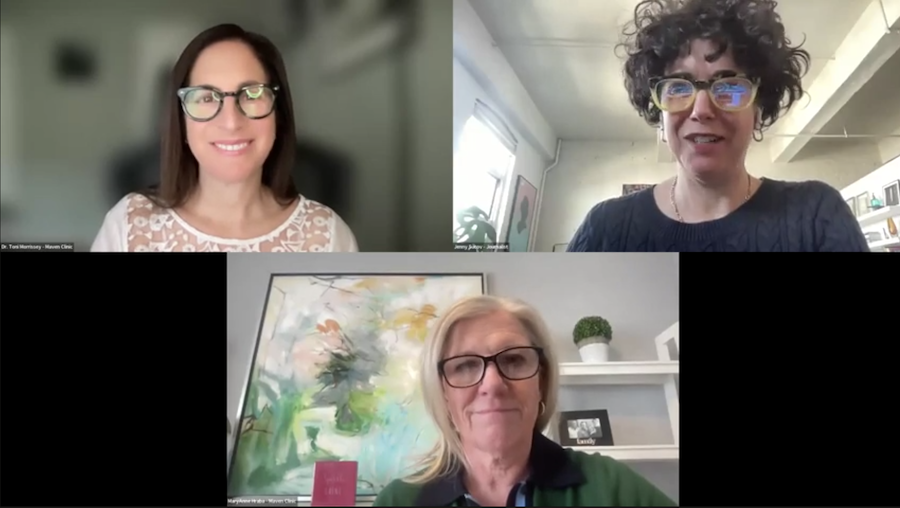How to Provide Best-in-Class Menopause Support in the Workplace


Despite it impacting half the population, menopause is rarely discussed. For many women, life-altering symptoms strike just as they’re reaching the peak of their careers, disrupting them at a time when peak performance is critical. Companies must step up and provide support, or they could potentially lose 20% of these women who move to less demanding jobs.
MaryAnne Hraba, RVP of employer growth at the Maven Clinic and Dr. Toni Morrissey, OB-GYN at the Maven Clinic spoke about providing best-in-class menopause support during From Day One’s October virtual conference. Jenny Sucov, health and well-being journalist moderated the thought leadership spotlight.
Maven is a team of health care advocates across the world who offer personalized care via telehealth. They partner with over 2,000 employers and health plans to bridge the gaps between limited access to care for everything from fertility treatment to pediatric care, including filling the gap in traditional menopause care.
Opening the Dialogue
Several years ago, Hraba started experiencing what she now knows is symptoms of perimenopause, including worsening depression and anxiety, low libido, and it became increasingly difficult to sleep. The most cumbersome symptom, especially with regards to showing up for work every day, was brain fog.
“I seriously thought that I had something wrong with my brain,” she said. “It just wasn't working anymore, like having a hard time even reacting in conversations.” She had no idea what was going on with her body. “It was just so hard to get through every single day.”
She went to see her OB-GYN and explained what was happening, but during the short visit was simply told that is what happens when you get older. No help or relief. Later, Hraba went down a Google rabbit hole, which made things worse. Unfortunately, only about 20% of OBs receive any sort of formal training on menopause, says Sucov.
Hraba then turned to Maven for care. She scheduled a virtual appointment with one of their OB-GYNs who was trained in menopause. “I got more out of that 15-minute appointment than anything prior,” Hraba said.

Questions about hormone replacement therapy, supplements, and a clear direction of where to go next were answered. “Finally, I was being seen and being heard, which was the first step.” She also got access to clinically vetted content she could trust, as well as community forums of other women experiencing similar issues. Additionally, she asked Maven for a local doctor who was trained to better help her and was connected with one covered by her insurance.
“Fast forward. Now I’m talking to this provider in person. I’m a lot more empowered, a lot more educated, and I’m able to have that two-way conversation,” Hraba said.
She still uses the Maven app for resources she doesn’t have access to locally, but when it comes to women’s health, it is going to take more than just one provider to fulfill her needs. “It's still a process. There’s no single magic bullet.” But thankfully, now that she feels better, her life—including her work life—have improved exponentially, she says.
Workforce Impact
The implications of menopause in the workplace are more far-reaching than employers may realize. “Menopause isn't just a personal health journey,” Dr. Morrissey said. “It impacts everybody around them in the workforce.”
Untreated symptoms can render even the most resilient individuals less able to manage stress, leading to higher absenteeism and decreased productivity, says Dr. Morrissey. Moreover, menopause often coincides with a pivotal career phase when many women are in or approaching leadership roles. Without adequate support, companies risk losing experienced professionals and stalling diversity progress in senior positions.
“Employers who invest in comprehensive menopause support aren’t just doing the right thing for their people, but they're making a smart business decision, and they’re creating a culture that normalizes conversations about menopause and provides meaningful, holistic care,” said Dr. Morrissey. How do women who go through this type of care feel? “They typically will say, now I feel back to myself.”
Effective Menopause Benefits
Providing tailored menopause benefits, such as telehealth consultations and educational resources, empowers employees and cultivates a culture that normalizes and supports women's health at all stages. By integrating menopause care into their wellness programs, employers can demonstrate a commitment to their workforce’s well-being, fostering loyalty and positioning themselves as leaders in employee care.
Here’s what Dr. Morrissey recommends for employers to make sure is included in menopause coverage:
Addressing menopause in the workplace is no longer optional—it’s a vital aspect of supporting employees’ well-being and fostering an inclusive work environment. As more women reach pivotal stages in their careers while navigating the challenges of menopause, companies that proactively offer comprehensive support can stand out as leaders in employee care.
Editor’s note: From Day One thanks our partner, Maven Clinic, for sponsoring this thought leadership spotlight.
Carrie Snider is a Phoenix-based journalist and marketing copywriter.
The From Day One Newsletter is a monthly roundup of articles, features, and editorials on innovative ways for companies to forge stronger relationships with their employees, customers, and communities.